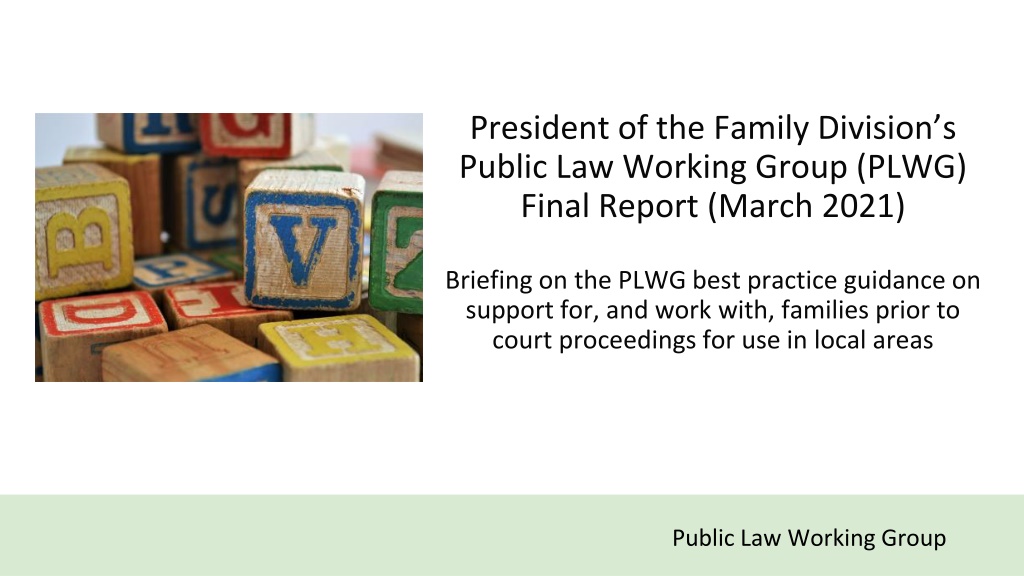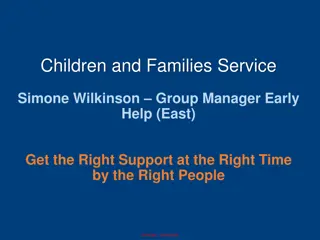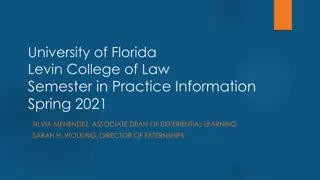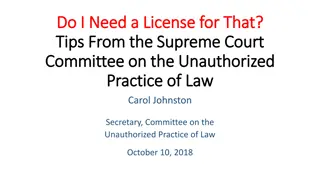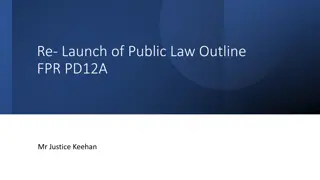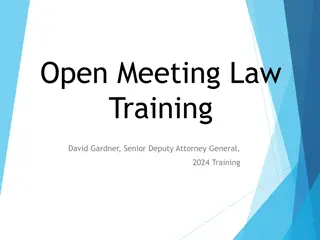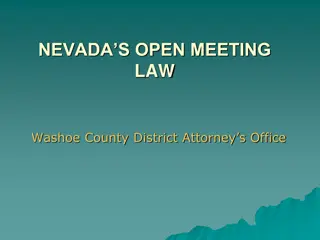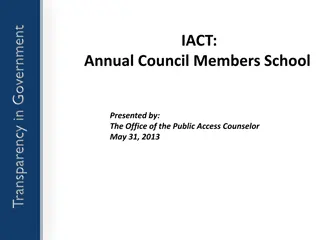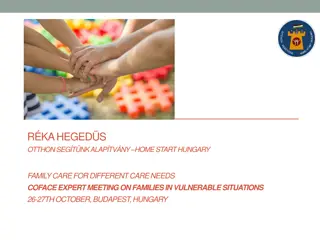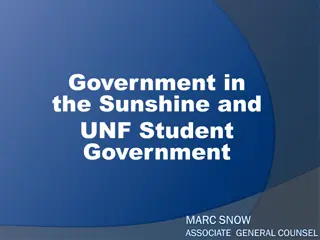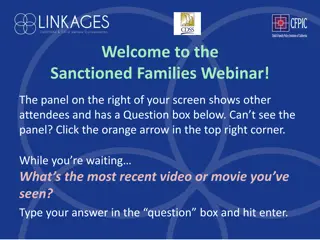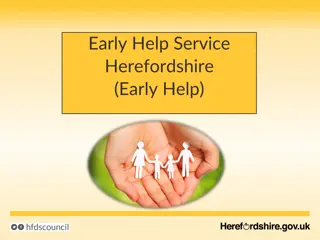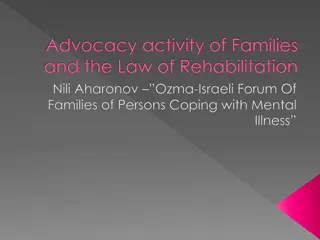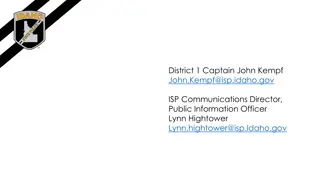Best Practice Guidance for Working with Families in Public Law
The President of the Family Divisions Public Law Working Group (PLWG) released a final report in March 2021, focusing on support for families prior to court proceedings. The report emphasizes the importance of collaborating with families, prioritizing the welfare of the child, and making timely and proportionate decisions. Key principles include listening to the child's views, managing risks, and ensuring clear communication. The guidance aims to empower practitioners to make informed and balanced decisions in pre-court work with children and families.
Download Presentation

Please find below an Image/Link to download the presentation.
The content on the website is provided AS IS for your information and personal use only. It may not be sold, licensed, or shared on other websites without obtaining consent from the author. Download presentation by click this link. If you encounter any issues during the download, it is possible that the publisher has removed the file from their server.
E N D
Presentation Transcript
President of the Family Divisions Public Law Working Group (PLWG) Final Report (March 2021) Briefing on the PLWG best practice guidance on support for, and work with, families prior to court proceedings for use in local areas Public Law Working Group
Background to the report and practice guidance The PFD launched a review of family (public and private) law at the end of 2018. The public law aims were twofold: understand whether children and young people can be safely diverted from becoming the subject of public law proceedings; and, that decisions about their lives are made swiftly and fairly once they are subject to proceedings. As well as identifying practical, cultural and legislative challenges and making some longer term recommendations for change, the PLWG s final report includes a suite of resources for practitioners e.g. best practice guidance and advice from children and young people. Differences in LA decision making and in the use of and/or approaches to the PLO and pre- proceedings process were identified as an area for focus and attention. Particularly in light of the significant regional variations in the use of urgent applications to the courts. Public Law Working Group
Rationale for this work Over time, there is a growing sense of an increase in risk-averse practice in all parts of the family justice system. The drivers include high-profile cases, criticism of professionals, particularly social workers, and societal shifts in tolerance of risk. For professionals, encouraging safe management of risk while building on family strengths and energising wider family support, is critical. The use of the PLO and pre proceedings should be an opportunity for families to embrace positive change. It should be a point of hope. The main aim of the best practice guidance on pre-court work with children and families is to share learning and practical tools to support practitioners in local authorities to confidently make consistent, timely and balanced decisions around the initiation of pre-proceedings. The guidance seeks to encourage confident practice. The guidance underlines the fact that the legal threshold being met does not always mean it is right, or proportionate, to escalate to pre-proceedings or instigate care proceedings. Public Law Working Group
Work with children and families: the underpinning principles in the guidance First and foremost, the child s welfare is paramount. The child s views must be heard. Managing and mitigating risks whilst working with the child and their family is key. Work with the child and their family requires a collaborative approach to co-producing plans and to positively support change. A partnership approach employing the existing skills, knowledge and resources of all partners and agencies involved with the family is vital. Accurate and timely recording is vital as are clear communications with the family. Court proceedings must be necessary and proportionate, an option of last resort, be clear why this application, why now. Timeliness and minimising delay are important. If in doubt all practitioners working in the system should always refer back to these principles. Public Law Working Group
Deciding to initiate pre-proceedings (1) The guidance underlines the fact it is not always right or proportionate, to arrange a legal gateway/planning meeting just because necessary threshold is met. Where one is needed, the meeting should be held in a timely way to consider the available information and decide the best course of action to protect the child s welfare e.g. move to pre- proceedings to issue immediate care proceedings. It should be chaired by a suitably senior manager and participants must agree on the specific issues, risks and mitigating factors of relevance. Factors to be considered: What is the lived experience of the child and impact on their wellbeing? How long have children s social care been involved with the family? What support has been offered to the family and how have they engaged with this offer? What assessments have been completed? Have changes already been made by parents to mitigate the identified risk factors? Public Law Working Group
Deciding to initiate pre-proceedings (2) If the legal threshold is met and attendees agree to initiate pre-proceedings then a tailored plan of action should be agreed, including: Any continuing support or any additional direct work with the child during this period? Any further support or direct work which could be offered the family to mitigate identified risks? How risks and/or positive changes in this period will be tracked? What expert assessments that are required, including who is being assessed, why, plus duration? Wider family members to be consulted to offer support or be assessed as alternative carers? Once the decision to enter pre-proceedings has been taken, the guidance notes that families can step out of the PLO process if it becomes clear that this level of intervention is no longer in the child s best interests. However, to prevent further instability (for both the child and their family) there must be a degree of confidence that the changes sought are achievable and sustainable. Public Law Working Group
Pre-proceedings and the PLO (1) The PLO brings together a series of steps that ensure the professionals working with children and their families explore all of the realistic opportunities to achieve the best outcome for the relevant children. It s important practitioners both view and approach this phase not simply as a procedural step to court: pre- proceedings are an intervention in themselves and act as the final chance to manage risk by supporting change. Every effort should be made to improve outcomes for the child as safely as possible. It also serves to narrow the issues if entry to court is required. Pre-proceedings may not always secure the required changes and the PLWG report recognises this fact. Courts are encouraged to do the same, noting that where timely, intensive work is underway, criticism of the local authority is unwarranted. Where all other options have been explored and issuing is the only safe option, the courts will benefit from the work that has been undertaken during pre-proceedings. Again, the report recognises the complex and difficult work social workers undertake and their skill and expertise in supporting children and families and the management of risk in the community. Public Law Working Group
Pre-proceedings and the PLO (2) Clear communication with the family about identified concerns and the expectation of all of those who are involved in the process, including clear timescales to prevent drift is vital. It is crucial that the parents clearly understand this process, what is expected of them, how the LA will work with their family and agree plans. It is important to consider any support parents might need to understand the nature of the LAs concerns e.g. advocacy or interpretation services. Older children will also need support to understand this process. The pre-proceedings phase should be no longer than 16 weeks but this is dependent on myriad factors, from the child s needs to the number of professionals involved. It is important social workers keep a clear, accurate record of the agreed plan and the status of assessments in progress and/or outcomes to inform future decision-making processes. A template developed and used successfully in one DFJ area is included in the guidance. Outcomes should be clearly recorded at the end of the PLO process - escalation to court, an extension to continue working with the family or stepping out of the process if sufficient progress has been evidenced. The deciding factor must always be the immediacy of harm. Public Law Working Group
Pre-proceedings and the PLO with newborns Pre-proceedings can be initiated for an unborn child and should be held as early as possible, with timescales monitored closely. If there is already involvement with the expectant parents, this work must begin as early as possible; the identification of needs, and the provision of support, must happen as soon as possible. Some assessments or interventions may not be able to start or finish before birth and specialist medical advice may be required about some of the timings. However, the agreement may be completed and agreed prior to the birth. If a decision to issue proceedings on birth is made then draft documents should be ready to send to lawyers prior to birth and parents should be provided with copies at the earliest opportunity. Placement options should be considered early on and discussed with parents e.g. parent-and-baby foster placements, so that early permanence is achieved for babies, as appropriate. Public Law Working Group
Additional reading and resources for practitioners The PLWG report includes a series of resources for practitioners who work with children and families during public proceedings: A pre-proceeding proforma to keep a clear record of this important work* A set of principles for the letter before proceedings plus a parent s commentary on the standard template for this letter Top tips for professionals from children and young people with experience of public law proceedings Best practice guides on the use of Section 20/76, on case management and special guardianship orders (SGOs) A revamped social work evidence template (SWET) plus new user guidance A new abridged version of the SWET for use in urgent hearings A PLO toolkit developed by Essex County Council. Public Law Working Group
Pre-proceedings proforma and recording An example of a pre-proceedings proforma in use in several local authority areas is included in the guidance. It fulfils a number of functions and is based on a simple, medical record. It has received positive feedback from social workers, families and the courts and has contributed to a reduction of public proceedings: It is a record and reminder of the issues of concern and the work that is being undertaken. When necessary, this can be referred to in discussions with parents. Its simple layout and format allows the family an opportunity to become involved and invested in the support and assessment. It puts into sharp focus the necessary elements that must be reviewed at each review. This is particularly important when considering the progress. It is a living document which records the changes that have been identified and it ensures the evidence that is gathered is relevant and fresh if proceedings are contemplated. It is important evidence of the work that has been undertake if proceedings are issued. This should be filed with the application to the court. If proceedings are issued, it avoids duplication of work particularly (expert) assessments that have already been undertaken. Public Law Working Group
